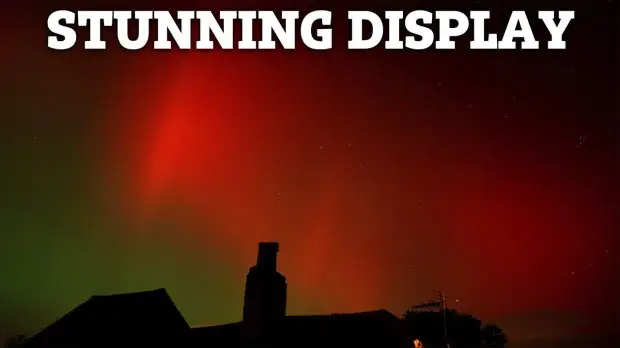BRITS were treated to a stunning Northern Lights display last night shining from Scotland all the way down to the south of England.
Vibrant red, green and blue aurora borealis were spotted as far as Kent after Earth was hit by a severe geomagnetic storm.
And now eager Brits who missed the display are wondering if they'll get another chance to see some more tonight.
This year has been a treat for sky gazers as the Sun goes through the peak of an 11-year "solar cycle".
Aurora displays appear when charged particles collide with gases in the Earth's atmosphere around the magnetic poles.
As they collide, light is emitted at various wavelengths, creating colourful displays in the sky.
The Met Office has revealed that there may be more Northern Lights on Friday night.
But sadly for those living in England, it's not expected to be visible as far south this time around.
And weather could ruin the view for others.
"Visibility of the auroras is likely to be more confined to Scotland tonight, as the effects of the coronal mass ejection wanes," Met Office spokesman Stephen Dixon told The Sun.
"Cloud cover and rain will obscure visibility for some, particularly in western areas, but some visibility is possible elsewhere in Scotland.
"Chances of aurora sightings on Saturday will be increasingly confined to further north in Scotland."
But fear not, as the Sun's current period of high activity means Britons could be seeing more colourful displays of the aurora borealis until the middle of next year.
The current peak is expected to until mid-2025, according to the Royal Astronomical Society.
After that, aurora displays will only be visible in high latitude countries such as Alaska, Canada, Iceland, Scandinavia, Finland and Russia.
Solar activity may leave us with beautiful displays but there it can also wreck havoc on communication systems including satellites.
"Apart from spectacular displays of the aurora, these eruptive events can cause a whole range of disruption to our technological systems and hence our everyday lives," explained Dr Steph Yardley, from Northumbria University.
"Examples include, but are not limited to, blackouts of high frequency radio communications and navigation issues across wide areas caused by solar flares, ground induced currents that affect the power grids caused by geomagnetic storms, and a radiation risk for astronauts, passengers and crew in aircraft flying at high altitudes close to the poles due to energetic particles."
Auroras – how do they work?
Here’s the official explanation from Nasa…

